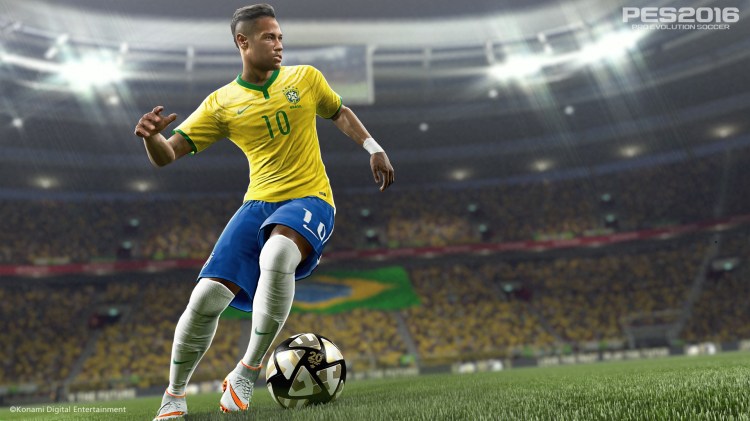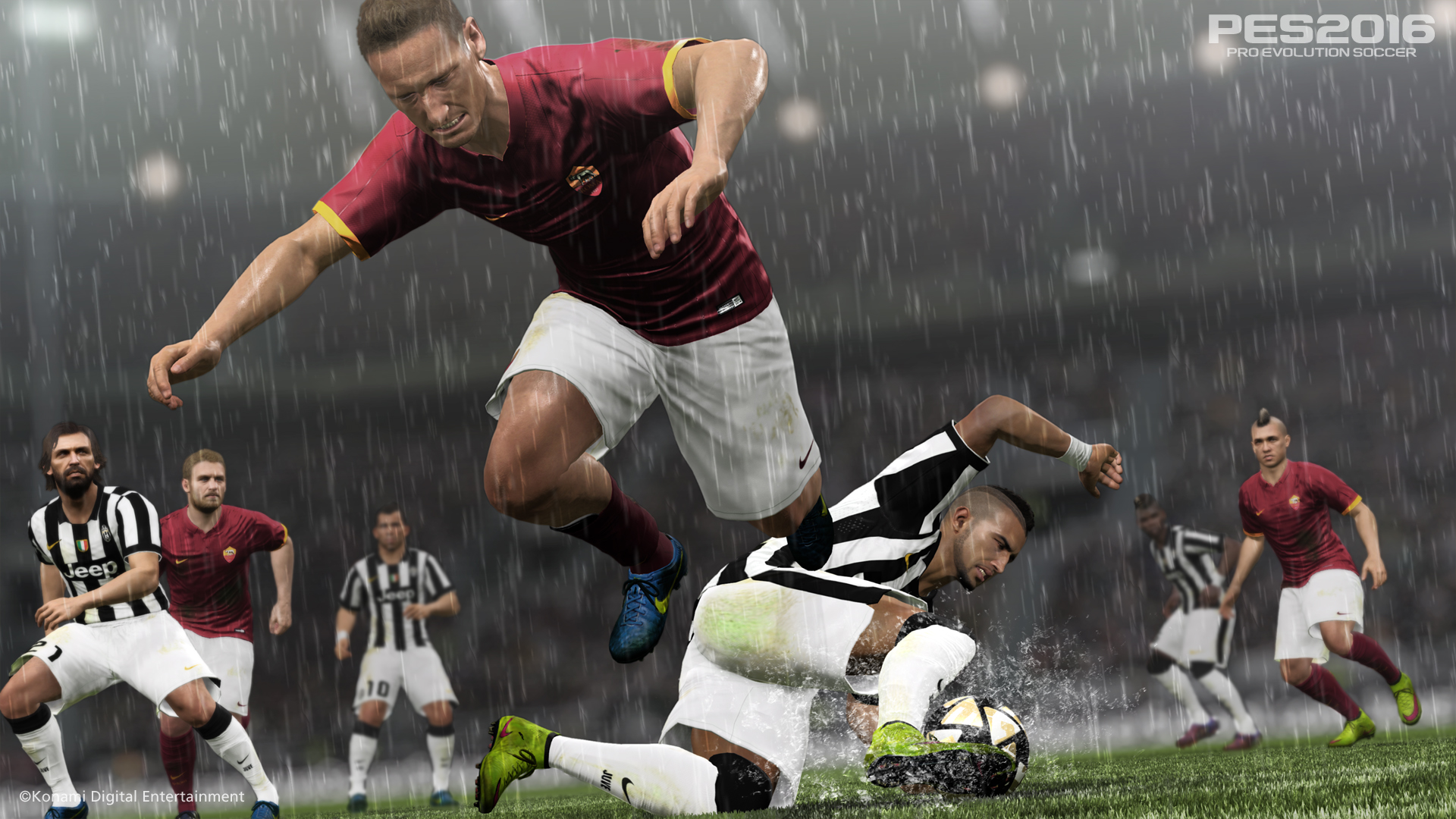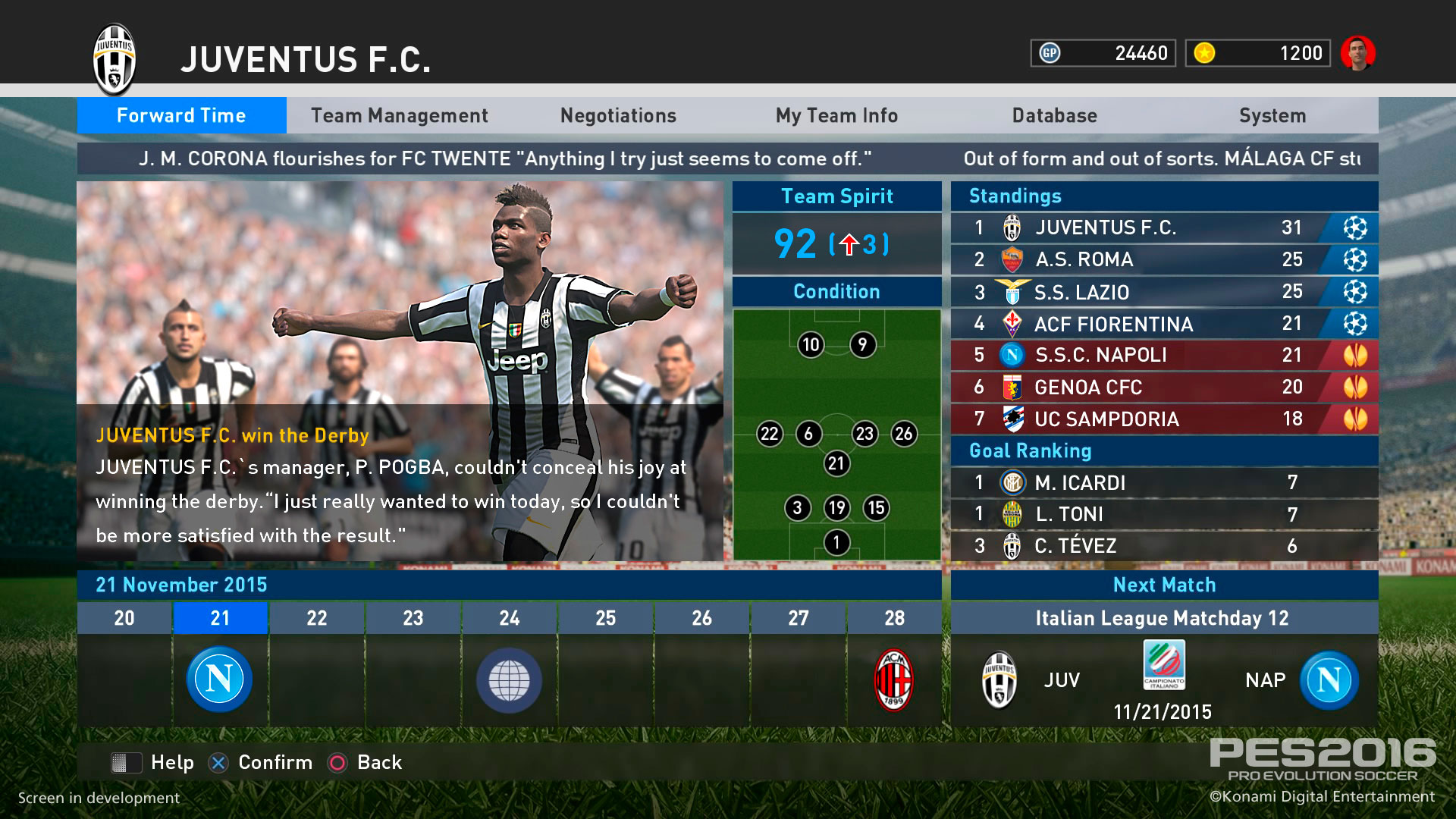Brazil versus Argentina. Arsenal versus Tottenham. U.S. versus Mexico.
Soccer thrives on rivalries.
For many years, the biggest digital derby has taken place between Konami’s Pro Evolution Soccer (PES) and Electronic Arts’ FIFA. PES used to dominate the matchup until EA revamped its offering a few years ago. Now, the American publisher’s franchise stands as the cup holder.
Since the switch in supremacy, Konami has worked to regain its place as best on the pixelated pitch. Like a struggling superstar looking to regain his form, PES has slowly worked its way back into playing shape, ready for a chance to shine once again.
With the multiplatform PES 2016, available now and reviewed here on PlayStation 4, the Japanese underdog might just have a claim to the championship.
Check out our Reviews Vault for past game reviews.
What you’ll like
Celebrating the fun of football
When did you use fun to describe a recent sports game? I’ve used words like realistic and detailed. Comprehensive, too. But not fun. And isn’t that the reason we play video games?
PES 2016 is fun.
Its version of soccer is fast and frenetic. The ball ricochets back and forth, as players feverishly pursue it. I’ve scored so many stupidly cool goals in this game — because it wanted me to.
The experience is less about physics and A.I. behavior or about mimicking the frustrating, yet authentic, aspects of soccer and more about the magic, the stuff that makes fans argue that the sport is an art form.
Mind you, PES has simulation-based aspects and layered gameplay mechanics, but they don’t break the action’s flow.
I like how you can squeeze the trigger to dribble the ball more carefully, allowing you to execute “jinking” runs past defenders. Pressing a bumper lets you drive through balls as if they were lobs with attitude, leading to wonderful scoring opportunities. The other trigger gives you manual control over your shooting in a simple and elegant way.
These touches lead to the best-playing soccer game available. While FIFA has its intricate control schemes, which in some cases are similar, I found PES to be more enjoyable and dynamic.
And that’s a big deal.
Making the beautiful game more beautiful
PES 2016 features the impressive Fox Engine. That name probably seems familiar because it’s the backbone of the gorgeous blockbuster Metal Gear Solid V: The Phantom Pain.
As you could imagine, PES looks pretty good as a result. In particular, superstars like Neymar (the series’ poster boy) and Lionel Messi (ironically, FIFA’s cover guy) received carefully detailed character models. Actually, most athletes that the general public will recognize have gotten special attention in this case.
You might remember how I mentioned that Roberto Firmino looked like a create-a-player in FIFA 16 when I reviewed that game. Thankfully, the recent Liverpool signing passes the eye test here.
PES 2016 does suffer from that generic look, however, when it comes to part of its roster. I noticed plenty of lesser-known players with different hair, skin, and eye colors than their real-life counterparts.
But hey, even those models benefited from the foxiness of the graphics engine. Although, I will say that the difference between the accurately modeled athletes and the rest of the roster is pretty dramatic.
It’s also worth noting that the uniforms are really sharp. Even the numbers on the back of the jerseys reflect light differently since they’re made of a vinyl-like material. For kit nuts like me, details like that matter.
Championing the club competition
While PES 2016 has some glaring holes with its licensing, it does include some of the biggest club competitions in the world. Having the chance to partake in the UEFA Champions League and Copa Libertadores is pretty great. In the case of Europe’s biggest club championship, even the obnoxious theme song — complete with high-pitched operatic vocals — made the cut.
Fans of South American soccer are especially lucky since they have both the Libertadores and Copa Sudamericana to play through. I really appreciate how fixtures in these tournaments have a distinct feel from the get go, as players walk out to raucous crowds wielding flares that fill the air with smoke.
In terms of the leagues that made it to this year’s title, I’m thrilled to see the entire Brazilian first division, including my beloved Vasco da Gama. Konami even modeled famous Brazilian stadiums like the Mineirão and Beira-Rio. Sadly, the location of last year’s World Cup final, Rio’s iconic Maracanã, is not part of that list.
The French, Dutch, Italian, and Portuguese championships are in the mix, too, along with multiple German teams. English Premier League clubs are present under nonspecific representations — except for Manchester United, which is licensed — but their rosters remain intact.
Plus, Chelsea fans can always jump into the edit mode if they can’t stand playing as London FC.
What you won’t like
Features that need more attention
Konami obviously spent a painstaking amount of time making PES play the way it does. But, I don’t see that same attention to detail in the different game modes. The available selection is pretty standard, including exhibition matches and the aforementioned club competitions.
You can also jump into training drills, which are similar to the ones you’ll find in FIFA. The activities here are more limited, though. I had fun playing through the different scenarios, but the FIFA variations give you more to do.
The same can be said for the career modes. You can play through the standard manager and player tracks, where you start from the bottom and get to the top. But FIFA feels more fleshed out and intuitive in these areas. In particular, I prefer how the EA product handles training, giving me a more hands-on involvement in the development of my players.
PES also has myClub, which is a take on FIFA’s wildly popular Ultimate Team experience. In myClub, you build a custom squad using a random set of players. Your goal is to optimize your team spirit (chemistry) by tweaking your lineup. As you play, you’ll earn points that you can use to acquire new stars. Like in Ultimate Team, you can also purchase another type of currency to immediately use for upgrades, instead of grinding through multiple matches.
As with the other modes, myClub just feels more stripped down than what you’ll find in FIFA. Ultimate Team gives you more ways to build and boost your lineup. And I also prefer buying card packs that feature multiple players and upgrades versus myClub’s system of buying athletes one by one.
Sloppy moments on and off the field
While PES does play beautifully, I couldn’t help but notice some issues during my time with the game. In many cases, my computer-controlled defenders would sit back instead of run toward loose balls, giving my opponent a chance to recover possession. Also, the action can feel excessively loose at times. Playing recklessly yields fewer consequences, and slide tackles are too easy to execute.
The commentary and presentation still lag way behind FIFA. I heard the same phrases repeated multiple times, and many were in the wrong context. During a blowout, the announcer shouted out how one player had scored his third goal even though he had scored more. In that same game, I heard how I was disappearing out of sight, and later on, I was suddenly in danger of disappearing out of sight after scoring another goal.
I’ve also heard the commentators talking over each other as their sound bytes played at the same time. While FIFA’s play-by-play is in dire need of an overhaul, it’s still the benchmark by a significant margin.
PES’s menus are a lot better than they used to be, but they’re still unnecessarily cumbersome. The main menu has the tile-based layout that FIFA adopted a while ago, but that doesn’t extend to other screens. The team-management page remains archaic, down to the cursor that makes selecting positions a chore.
Conclusion
Konami has made the years-long derby with EA interesting again, posing a stunning comeback with its latest effort.
Pro Evolution Soccer 2016 is not only the best PES I’ve played in years — it’s also the best soccer game I played this year.
It might not be the most fully featured game or the most polished. And the list of things to fix for 2017 is pretty obvious. But, PES 2016 feels right. And for me, fun beats features every single time.
We have ourselves a game, everybody.
Score: 83/100
Pro Evolution Soccer 2016 is out now for PlayStation 4, Xbox One, PlayStation 3, Xbox 360, and the PC. The publisher provided GamesBeat with a PlayStation 4 code of the game for purpose of this review.
VentureBeat's mission is to be a digital town square for technical decision-makers to gain knowledge about transformative enterprise technology and transact. Learn More





